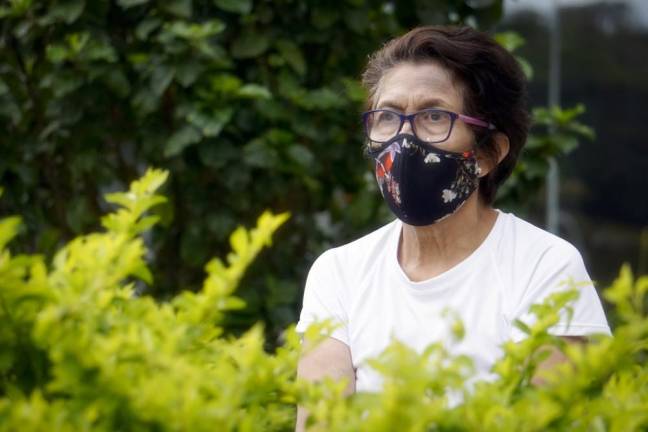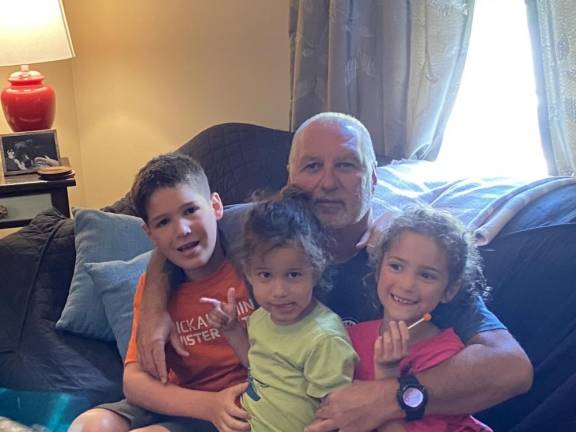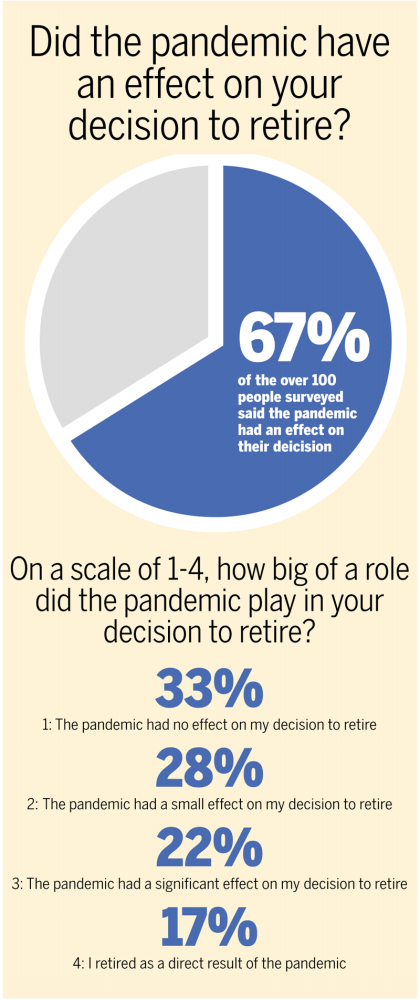Pandemic pushes locals into retirement
The pandemic changed nearly every aspect of life, including the way people retire. In response to a recent Pew Research study that documented a spike in 2020 retirements, our newspaper surveyed more than 100 recent retirees — and spoke to a handful of them — to illustrate why and how the pandemic affected so many individuals’ decision to leave the workforce.


A steady rate of approximately two million U.S. baby boomers were retiring every year from 2011 to 2019, according to a recent Pew Research study.
Then 2020 came along.
By the third quarter, the total of retired boomers nationwide rose to 25.4 million, a 3.2 million increase in retirees compared to the same period in 2019.
In light of this study, our newspapers surveyed more than 100 local people who retired after March 2020 and found that 67% of respondents reported that the pandemic was a contributing factor in their decision to leave the workforce.
Some went willingly. A Vernon, N.J., teacher left in response to stress stemming from an increased workload.
Others weren’t quite ready, but the pandemic still managed to push them out of work. Multiple readers, including a local CFO with 30 years of experience in banking, said they were laid off during the pandemic — and have been unable to find new work since — saying that ageism is causing their resumes to be passed over by employers.
To showcase the multilayered way in which the coronavirus pandemic pushed local boomers to retire, we spoke to a handful of these recent retirees about why they chose to leave the workforce earlier than planned.
Boomer burnout
“Mentally, I was just drained,” said Warwick, N.Y., resident Joseph Mauro. He retired at the tail-end of 2020 after a long career handling telecommunications for various hospitals; most recently, a sixteen-year posting at Catskill Regional.
“When I worked in the city we had the AIDs epidemic, the TB outbreak. When we got to the coronavirus, I said: ‘I can’t do this any more.’”
He stayed because the money was good, but the hospital environment was taking a toll on his overall well-being. The nurses he’d befriended over the years were “like burnt out zombies” and, as a 65-year-old, he was worried about his potential health risks.
Mauro’s caution regarding exposure was warranted.
Chester, N.Y. resident Connie Roach, a former physical therapy assistant, loved her job at local nursing facility. She wasn’t planning to leave for at least another year and a half. But she contracted COVID-19 in December 2020 and never fully recovered; she retired to focus on her health.
“I’m just on a rollercoaster of doctor visits,” she said. “It was just a decision I needed to make for my wellbeing.”
In our survey, 27% of respondents retired from the health care industry.
One RN working in intensive care described retiring due to a “burnt out mind and body.”
Another nurse left in response to a doubled workload and understaffed unit.
Multiple health care workers said that they retired because they were high risk.
Of the health care retirees surveyed:
• 14% said the pandemic had no role in their decision to retire.
• 25% said the pandemic had a small effect on their decision to retire.
• 39% said the pandemic had a significant effect on their decision to retire
• 21% retired as a direct result of the pandemic.
Ageism
Monroe, N.Y., resident Karen Hall had been working for eight years as Chief Financial Officer for a community bank in Livingston, N.J., when her position was eliminated in September 2020. She was one of many staff members let go in the bank’s attempt to cut back payroll expenses.
And despite more than three decades of experience working for banks as a CFO or controller, she wasn’t getting any responses to her employment applications.
“I was even applying to bookkeeping jobs, because I was thinking: ‘At this point in my life, do I really need to work sixty hours a week and commute an hour each way?’” explained Hall.
“I couldn’t even get a response from that. I don’t need to make the big money anymore, I just want to at least feel like I’m accomplishing something; I could help a small company out with my expertise and work ethic.”
Her story is a familiar one.
Sussex County, N.J., resident Robert Moore, a mechanical engineer with forty years of experience in the manufacturing industry under his belt, was laid off six months into the pandemic. The company, which manufactures lighting systems for commercial clients like Yankee Stadium, laid off much of the staff in response to a sharp, pandemic-induced decline in business.
Moore didn’t want to stop working.
“I said: ‘After sixteen years, that’s it? A two-second conversation and I’m done?’”
Financially, he wasn‘t ready to retire. But after applying to jobs for six months, he only got one interview that didn’t pan out.
Both Hall and Moore are confident that their resumes were being passed over due to ageism; employers assuming older applicants are too expensive, too old or just won’t stick around long enough.
“I have friends in the banking industry and other industries, and there’s definite ageism discrimination out there, no doubt about it,” added Hall. “Unfortunately.”
The cards you’re dealt
“To tell you the truth, after trying to get a job after seven, eight months, it’s a little disheartening,” said Hall. “Did I really want to do it now? No. I was planning to in maybe another year or two. But, you’re dealt the cards you’re dealt and you have to make choices.”
Hall plans to make the most of it by spending time with her grandkids.
Moore said he misses work tremendously - and makes both his neighbor and sister nuts trying to talk to them about mechanical engineering, his passion that they don’t understand. He may start volunteering with a local technical school to keep busy.
Connie Roach is trying to figure out how to spend her time moving forward; she loves to quilt, cycle and spend time with her grandchildren, but that doesn’t take up forty hours a week. “The suddenness of retiring has really thrown me for a loop,” she said. “Right now, I’m not really seeing a silver lining in this because I wasn’t prepared.”
You changed, a neighbor said
And Joseph Mauro is finally getting a week with his grandkids in Virginia after being away from them for so long.
His neighbor told him he’s changed since retirement; Mauro agreed. He’s not so stressed anymore.
